- Home
- Rodman Philbrick
The Mostly True Adventures of Homer P. Figg Page 4
The Mostly True Adventures of Homer P. Figg Read online
Page 4
Mrs. Bean smiles at me and shrugs. I get the idea that nothing Mr. Brewster does surprises her.
“Come along, son,” he says, standing up, “and thee will be shown the secret of Brewster Mines.”
“The boy needs a bath,” Mrs. Bean points out. “I doubt he’s had a bath this year. And maybe last year, too.”
“After he surveys the mine,” says Mr. Brewster, clamping his hand on my shoulder. “After he’s seen our amazing mine thee can scrub him until he bleeds.”
I’m hoping that’s just more Quaker talk, but Mrs. Bean has a soapy kind of gleam in her eye. Before I have time to make plans for escape, Mr. Brewster is marching me out the door and into the long grass. We’re going uphill, away from the big house, away from the warm kitchen, and the sky is so thin and cool and blue it makes me feel a little out of breath somehow.
Pretty soon we come to a path, worn into ruts by wagon wheels, and then to a set of rusty iron rails hammered into the hillside. We follow the rails. From around the bend comes the gentle murmur of flowing water, but sound must be tricky in these hills because I never do see the water.
All the while Mr. Brewster’s big voice never stops booming and it comes to me that he couldn’t keep a secret even if it killed him, because secrets are related to lies, and I doubt Mr. Brewster ever lied in his whole life. Which reminds me of my brother, Harold, who is probably halfway to the war by now, and worrying about that makes it hard to concentrate on all the things Mr. Brewster is saying about gemstones and mines, and why God has put us on earth, and how He tests us.
“So I searched for healing water and instead found the rainbow,” he’s saying. “Not a pot of gold exactly, but a vast deposit of tourmaline, which comes in all the colors of the rainbow.”
Tourmaline. Sounds like a pirate name to me. Must be I got pirates on the brain for some reason. But Mr. Brewster explains that tourmaline is a gemstone used in costume jewelry. When polished it shines like diamonds or rubies or emeralds, depending on how it’s cut.
“Tourmaline brought me great wealth,” he says. “It did not bring me wisdom or show me the path. It was God who provided wisdom, and Frederick Douglass who showed me the path.”
Before he can explain, we come upon the mine itself. I’ve been expecting a proper tunnel cut into the side of the mountain, like I’ve seen in storybooks, but Mr. Brewster’s mine is more like a big pit in the ground. We’re looking down on some rusty tin roofs and a bunch of rickety-looking shacks where the miners work, prying hunks of rock from the ground and cutting out the raw gemstone. Except there are no miners working, there’s no one at all.
Mr. Brewster guides me down a narrow little pathway into the empty pit.
“This is the secret of Brewster Mines,” he announces, quite happily. “We ceased production two years ago, when the war started.”
“But why is that a secret?” I ask.
“Because the mine remains active,” he says mysteriously. “It is convenient if the world assumes that the activity is related to mining. Folks think we provide lead and copper to the Union Army. That is not true, and I pray for forgiveness for letting it stand without correction. Because my untruthfulness is in the service of a greater good.”
For once in my life I keep my mouth shut and wait for him to tell me whatever it is he wants to say. I assume he’s going to confess there are fugitive slaves hid in the mines somewhere, like Smelt said, but I’m not supposed to know that, so I got to be ready to act surprised when it comes out.
Only it don’t come out, not exactly.
Mr. Brewster drapes his long arm over my shoulders and holds on, like he expects me to bolt any second. He lowers his big voice to a ragged whisper. “Ebenezer Smelt is well-known in these parts,” he confides. “Mr. Smelt is often found in the company of William Mullins, better known as ‘Stink.’ I mention this because thee told Mrs. Bean thee hailed from a place called Smelt. To my knowledge, no such place exists. So I must assume thee are in league with the murderous Mr. Smelt and his evil associate.”
I started out keeping my mouth shut on purpose, but Jebediah Brewster has knocked the words right out of me.
HAROLD READ ME A STORY once about a man who could see into your mind. Think of a number and he’d pull it out of a deck of cards. Man could tell what you were thinking before you thought it. He knew your aunt Mildred’s birthday, and how many horses your brother owned, and if you preferred rhubarb to apple pie. At the end he saw things that got him tarred and feathered and run out of town on a rail, and that was the best part of the story.
I’m wondering if Jebediah Brewster has that same power to read minds. Doesn’t seem possible he’d figure everything out because of one measly word.
Turns out it wasn’t only the word Smelt, it was seeing the man himself.
“Mr. Smelt has been following us,” Brewster explains softly, his hard blue eyes lifted to the hills around us. “Thinks he’s being clever, but the good Lord gave me the eyes of an eagle. That isn’t a dirty old weasel, that’s Ebenezer Smelt, scuttling among the rocks. He’s the color of dirt, but I see him, indeed I do.”
“He made me do it,” I manage to say. “Made me come here on a rotten lie.”
Mr. Brewster and Mrs. Bean have been so good and decent it makes me want to cry, having to admit that I’ve been sent to betray them.
“Maybe he did and maybe he didn’t,” Mr. Brewster says, not unkindly. “Makes no difference. Our strategy remains the same. Let them watch us, Smelt and his confederates. See what it gets them, doing the Devil’s work.”
“They got a darky man,” I tell him, eager to make up for all my falsehoods. “I think they mean to kill him, or sell him for a slave.”
Brewster glances at me sort of sideways, his eyes never straying long from the hills. “‘Darky’ is not a proper word,” he says, very stern. “If a man has dark skin, say that he is colored, or that he is African. Or better yet, do not refer to his complexion. Does the Lord care if we be pink or brown? I assure thee, He does not.”
“They put a sack on his head,” I tell him. “The colored man.”
“That would be Mr. Samuel Reed, the conductor,” says Brewster, squinting into the distance. “He has been leading a group of slaves to freedom and was abducted two days ago. We’ve been on the lookout ever since.”
I figure by conductor he means the colored man works on a train, collecting tickets, but Mr. Brewster is talking about the Underground Railroad, which is a different thing. He explains there aren’t any actual trains on the Underground Railroad, and no rails to speak of. But they do have conductors, who guide fugitive slaves from station to station. Each “station” being a house or a hiding place. Could be a root cellar or a shed or a mine, anywhere they can hide fugitives on their way north to Canada, where slavery has been outlawed.
“Thousands have come this way,” he explains. “They are given safety at this station and many others like it. Men like Samuel Reed risk their own freedom so that others may be free. And men like Mullins and Smelt are always waiting in the shadows, eager to betray them for a few pieces of silver. The evil that men do for money continues to astound me. Are thee kin to such men, Homer Figg? Speak the truth, for I shall know if thee lie.”
I decide that lying to Jebediah Brewster is like lying to God — you can’t fool either one — so I tell him about coming upon Stink and Smelt in the woods. How they stole Bob the horse and took me prisoner, and how Smelt will be waiting for me when night comes, and that he will want to know where the fugitives have been hid.
Mr. Brewster nods. “It’s as I suspected. Come along, Homer. Back to the house, as if we are not aware that Mr. Smelt is watching us. This evening after supper thee wilt report to him, as instructed.”
“What should I tell him?” I ask. Mr. Brewster’s smile is as hard and cold as a diamond gemstone. “Tell him the truth,” he says. “The truth shall set thee free.”
NIGHT NEVER TOOK SO LONG to come. It’s like someone nailed the sun in the sky
just to torment me. Because the last thing in the world I want to do is come face-to-face with Ebenezer Smelt. He might try to snatch me away, and even though Mr. Brewster says to tell him the truth, I’m afraid of what he’ll do with the truth, because the real truth is I don’t know what’s going to happen when night finally gets here.
Mr. Brewster is as calm as some old white mountain waiting for the wind to wear it down. There’s no rush about him. He waits like waiting is all he ever wanted to do.
“I was raised among the Society of Friends, the people thee call Quakers,” he says, staring at me like a great bearded barn owl.
We’re on the side porch, facing the rolling hills to the west, and every shadow looks like someone coming to steal me away. In the big warm kitchen Mrs. Bean is cooking supper. The smell of beef and potatoes wafting out to the porch makes my throat feel thick, like it’s hard to swallow. Like I still have a few fat lies stuck in my throat.
“The Friends believe no man may be enslaved by another,” Mr. Brewster continues, very stern. “We also believe no man has the right to kill another, even in war, no matter how just the war. Forbidden from the battlefield, I must find another path toward righteousness. Such a place is here,” he says, thumping his rocking chair with his fist.
Jebediah Brewster stands up tall as the world and takes hold of my hand.
“Come along, Homer Figg. There’s a sight thee must see.”
He takes me to the basement door. Figure he’s going to lock me up like Squint and throw away the key, except there are no locks on the doors in the Brewster house.
“Be not afraid,” he says. “No harm will come to thee.”
He lights a glowing lantern and throws open the basement door. From below comes the light of other lanterns and a gentle murmur that sounds like a deep river.
A deep river that cries like a baby.
THERE’S A WHOLE OTHER WORLD in Mr. Brewster’s basement. Must be twenty people hiding down there, and two babies wrapped in blankets. Two or three families, all on the run, looking to find a new life. On the run, all the way from Maryland, with slave catchers dogging their trail. The fugitives look thin and hungry and scared. They jump at every sound from above. The squeak of the floor when Mrs. Bean walks across the kitchen, a window rattling in the wind, the sad cooing of a mourning dove up in the eaves — every noise makes them nervous and fearful.
Mr. Brewster says that fear is something slaves carry with them, and they won’t be rid of it until they’re safe across the border in Canada, with nobody to snatch them back. Some of these folks have escaped more than once, only to be seized by slave catchers and taken back. Makes it worse for this particular group because their brave conductor, Samuel Reed, vanished into thin air. They figure if it can happen to him, it can happen to them.
If Stink and Smelt have their way, it will.
“All I do is offer shelter for a night or two,” Mr. Brewster explains. “The real work, the dangerous work, is done by the likes of Mr. Reed.”
The basement is fixed up real nice, with rugs on the floor and rows of sturdy bunks, and plenty of food, and special baffles to keep the lantern light from shining out the basement windows. It’s way better than the barn where me and Harold lived. But no matter how nice Mr. Brewster made the place, it’s still a kind of dungeon, even if there are no padlocks or chains. You can feel it in the air, the people wanting to get out, to be free of this place, or any place where they’ve got to be afraid.
“I would have these poor folk in my own house, as honored guests, but there are many who would burn us out if we did so,” Mr. Brewster says, bringing me up out of the basement. “Burn us to the ground they would! Thee think runaway slaves are fearful? Their fear is nothing to the fear the white man has of the black. Abolitionists who preach against slavery will not let colored worshippers sit with whites in their churches. They think it unclean that light and dark should mix.”
“How will they get to where they’re going?” I ask.
“Same way they got here,” he says. “On foot and in wagons. But mostly on foot. With slave catchers lurking, they must travel at night, under cover of darkness. Especially on cloudy or moonless nights. Like this evening, for example.”
He doesn’t say so, exactly, but he means the slaves will be on the move tonight.
“What should I do?” I ask him.
Mr. Brewster sets me down in the kitchen, where Mrs. Bean has put out steaming plates of beef and potatoes, slathered in gravy.
“Thee must do whatever is true to thee,” he says. “It is not for me to force a thing upon thee, or to make thee believe as I believe.”
I never had such a plate of food in my life — Squint wasn’t much for plates, for that matter — but what I saw in the basement has killed my appetite. Men and women and children and babies, all running from those who would chain them up, and buy them and sell them like cattle. Gets me thinking how much I hated it when Squinton Leach locked us up, or whipped us with his belt, or sold Harold into the army like he was something Squint owned.
“Get a gun,” I urge Mr. Brewster.
He shakes his great white head. “That I can not do. I am sworn to peace.”
“Mrs. Bean,” I say. “Tell him to get a gun!”
Mrs. Bean chuckles and gives me a sad smile. “Gave up on that years ago,” she says. “He will not stir from his beliefs.”
“If you won’t get a gun, then tell me what to do,” I ask, pleading.
He sighs so deep it almost makes the windows rattle. “Thee must decide,” he says again. “But I will say this much. It all boils down to this: A person has only two options in life, to do something or to do nothing.”
“What’s that supposed to mean?”
“It means that if thee do nothing, thee may stay in this house. Thee will be safe and cared for and will never go hungry. Mrs. Bean will see to that. Or thee can do something. Something to help Mr. Smelt and his confederates, or something to help those who have escaped their chains.”
“This isn’t fair,” Mrs. Bean admonishes him, shaking her gravy ladle. “He’s just a boy, and a scrawny one at that!”
“I know,” says Mr. Brewster, sounding regretful. “But boys are fighting this cruel war. Boys are enslaved, and boys own slaves. None may escape. All must decide.”
“If you won’t get a gun then give me one,” I ask, begging.
“There are no guns in this house. Not for thy purpose.”
I shake my head. Comes to me that Jebediah Brewster is crazy, and that’s like God Himself being crazy. As crazy as plagues and pestilence, as crazy as the tree that fell on my father, and my Dear Mother dying so young, and Squint being so mean. I can’t stand another minute of this, with all the questions in my head, trying to decide things that are better left to God and Mr. Brewster.
“Where are you going?” Mrs. Bean calls out when I get up from the table. “What are you going to do?”
But I’m running out the door without an answer. Running into the sooty blue darkness where Smelt is waiting. Smelt with his knife and probably a gun, too. And I’ve got no idea what to do, no idea at all.
Except I know one thing. I can’t do nothing. Nothing is not an option.
BREWSTER’S PRIVY LOOKS better cared for than Squint’s whole house and is nearly as big. It’s got fancy wood trim, all painted neat and white, and a half moon cut in the door. Very civilized, and way better than the cow ditch me and Harold used when we had to do our business out behind the barn.
I’m most ways to the privy door when a dirt-colored hand clamps over my mouth and yanks me into the shadows behind the building.
Smelt with his knife, like I figured.
“Evening, boy,” he whispers, his nasty little eyes flicking to the big house. “If you try and scream I’ll wring your neck and drop your body into the cesspit. Nod if you understand.”
I nod. Smelt grins, showing me his tooth.
“Fatten you up, did they? Fuss over you some? Hope you enjoyed it, boy.
Hope you paid attention. ’Cause if you can’t tell me where they hid them fugitives, this world’s got no more use for Homer Figg. You might’s well jump in that cesspit and save me the trouble.”
My brain has been racing since I run from the house, trying to find a lie that will save me and the runaway slaves and Mr. Brewster, too. Comes to me in that very moment, with Smelt jabbing the point of his knife in my ribs, looking for a soft spot. Don’t know if the lie is powerful enough to work, but it’s the only one I have at the moment.
“Gemstones!” I exclaim. “Tourmaline!”
“Hush your voice, boy,” he hisses.
“In the mine,” I tell him. “They’re hiding in the old tourmaline mine.”
That filthy hand of his starts squeezing on my neck. “The mine? Who told you, the cook or the old man?”
“Showed me,” I say, gasping as his hand tightens.
“You saying he took you up to the mine and showed you where he’s got the slaves hid? You expect me to believe that?”
The part of the lie I’m counting on is that Smelt doesn’t know he was spotted shadowing me and Jebediah Brewster to the mines. Best kind of lie has some truth in it, just like Smelt said. Used to drive my brother, Harold, crazy when I’d tell folks our Dear Father was killed by a tree that measured a mile high from roots to top. The tree was real but the mile wasn’t, and Harold said that made it worse, telling a lie that was partway true.
I can see in Smelt’s eyes that he’s trying to catch me lying but hasn’t so far, because he knows Mr. Brewster really did show me the mine.
“I been all over that site,” Smelt says, puzzling it out. “Didn’t see no fugitive slaves, nor any place to hide them.”
“Old shed with a rusty tin roof,” I tell him, making it up as I go along. “There’s a secret passage in the shed.”
“Nothing in that shed but rocks and dirt,” he says suspiciously.
“Under the dirt,” I tell him. “There’s a door under the dirt. Mr. Brewster wouldn’t let me go down there, but he lifted the door up enough with his foot so I could see the ladder down.”

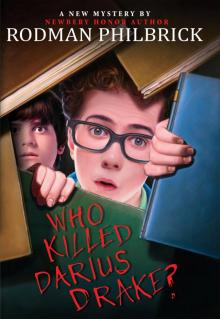 Who Killed Darius Drake?: A Mystery
Who Killed Darius Drake?: A Mystery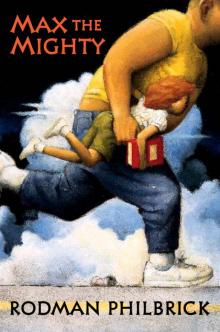 Max the Mighty
Max the Mighty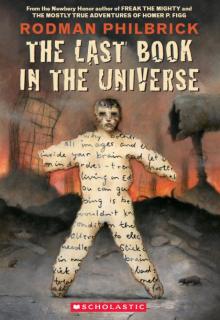 The Last Book in the Universe
The Last Book in the Universe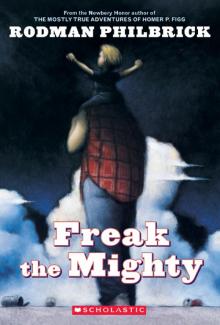 Freak the Mighty
Freak the Mighty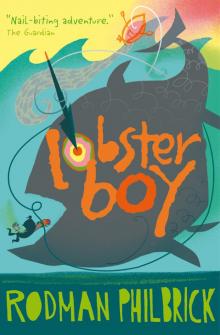 Lobster Boy
Lobster Boy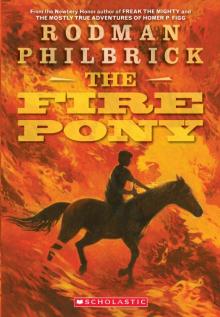 Fire Pony
Fire Pony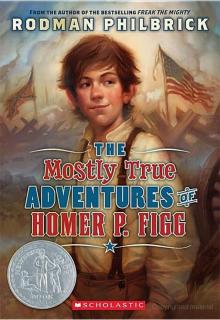 The Mostly True Adventures of Homer P. Figg
The Mostly True Adventures of Homer P. Figg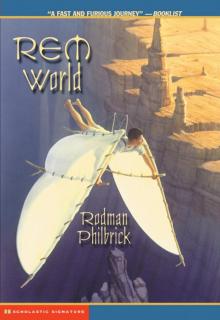 Rem World
Rem World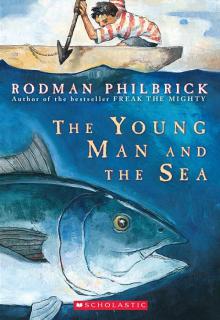 The Young Man and the Sea
The Young Man and the Sea Wildfire
Wildfire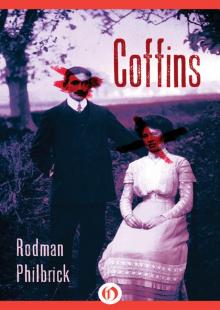 Coffins
Coffins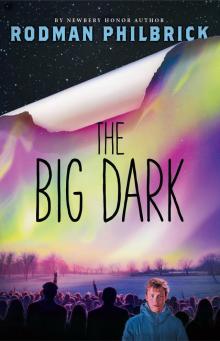 The Big Dark
The Big Dark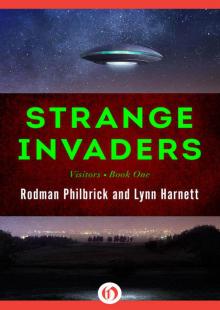 Strange Invaders
Strange Invaders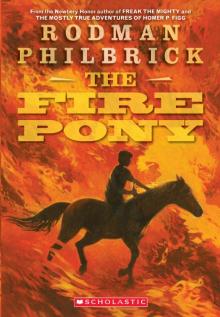 The Fire Pony
The Fire Pony The Haunting
The Haunting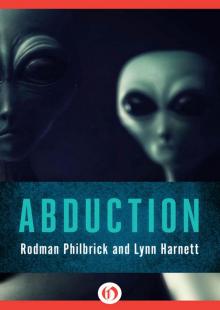 Abduction
Abduction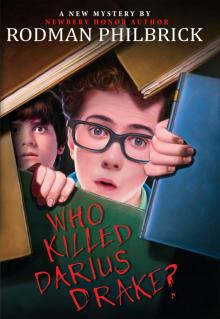 Who Killed Darius Drake?
Who Killed Darius Drake?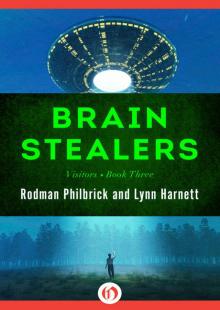 Brain Stealers
Brain Stealers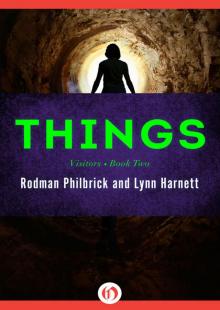 Things
Things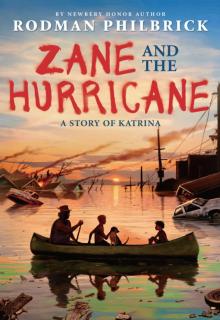 Zane and the Hurricane
Zane and the Hurricane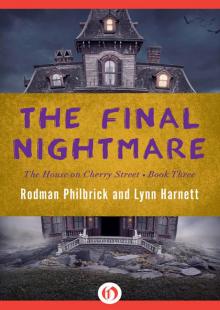 The Final Nightmare
The Final Nightmare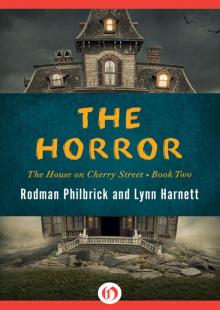 The Horror
The Horror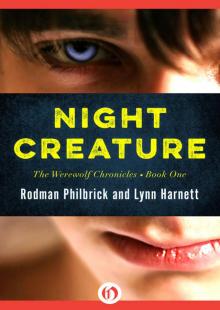 Night Creature
Night Creature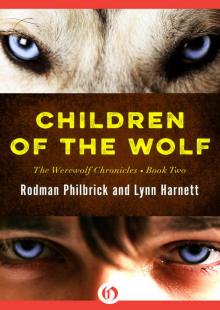 Children of the Wolf
Children of the Wolf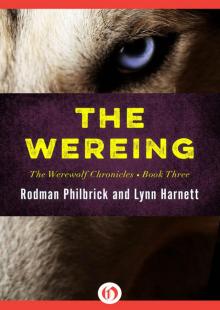 The Wereing
The Wereing